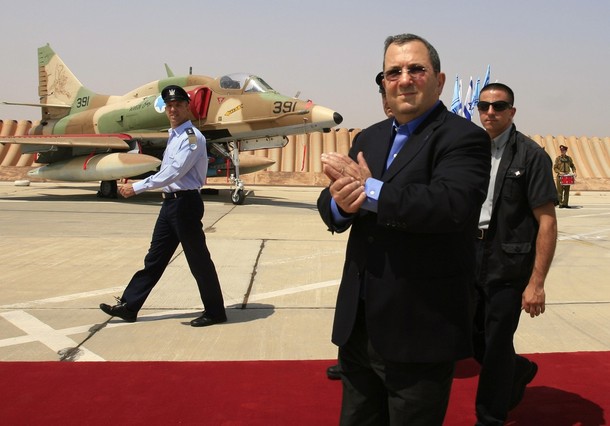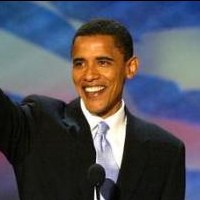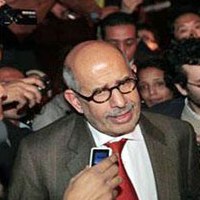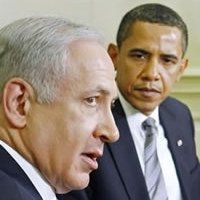![]()
Woensdag, 1 December 2010 | The Guardian | Bewerkt door Crethi Plethi

Ehud Barak, Minister van Defensie, tijdens een ceremonie op de Hazerim luchtmachtbasis in Israël, 31 Juli 2007. (Photo: TSAFRIR ABAYOV/AFP/Getty Images)
WikiLeaks: Ehud Barak Zet Deadline Voor Aanval Op Iraanse Nucleaire Installaties Op Eind 2010
Uit gelekte documenten van de Amerikaanse Ambassade in Tel Aviv blijkt dat Ehud Barak, de Israëlische minister van defensie, begin juni 2009 Amerikaanse congresleden heeft gewaarschuwd dat er tot eind 2010 tijd is voor een aanval op Iraanse nucleaire installaties. De gelekte documenten zijn onlangs gepubliceerd op WikiLeaks.
Israël beschouwd 2010 als een “cruciaal jaar” voor een eventuele aanval op Iraanse nucleaire doelen voordat de Iraanse regering de beschikking krijgt over nucleaire wapens. Israël heeft de Verenigde Staten al meerdere malen gewaarschuwd dat de tijd dringt, als ze willen verhinderen dat Iran een nucleaire bom ontwikkelt.
Volgens de op WikiLeaks gelekte documenten heeft Ehud Barak tegen Amerikaanse congresleden gezegd dat “tussen 6 en 18 maanden vanaf nu een eventuele aanval op Iran nog mogelijk is om het verkrijgen van nucleaire wapens door Iran te verhinderen.” Barak voegde daaraan toe dat elke militaire oplossing na die periode “zal leiden tot onaanvaardbare nevenschade.”
Barak’s opmerkingen in 2009 tegen de Amerikaanse congresleden waren één van de vele gelegenheden van de afgelopen vijf jaar waarin Israëlische leiders en ambtenaren getracht hebben om de VS ervan te overtuigen dat actie tegen Iran noodzakelijk is, omdat de nucleaire ambities van Iran een existentiële bedreiging voor Israël en andere landen in het Midden Oosten vormen. Het wordt algemeen aangenomen dat Israël zelf een uitgebreid nucleair arsenaal heeft, maar dit is nooit officieel door Israël bevestigd. Eén van de argumenten is dat Israël het Nucleaire Non-proliferatieverdrag nooit heeft ondertekend, terwijl Iran dat wel heeft gedaan. Maar het mag duidelijk zijn dat Israël, mocht het kernwapens hebben, geen zins van plan is om een kernwapen in te zetten tegen haar buurlanden. Iran daarentegen heeft reeds meerdere malen laten weten dat het maar al te graag het ‘Zionistische regime’ (een eufemisme voor de Joodse Staat) wil laten verdwijnen.
“Als de Iraniërs hun nucleaire installaties blijven beveiligen en de beveiliging uitbreiden zal het moeilijk worden om ze te treffen en te beschadigen,” volgens een document uit november 2009 van de Amerikaanse ambassade waarin medewerkers van het Israëlische ministerie van defensie worden geciteerd. In een discussie over de komende levering van GBU-28 bunker-busting bommen aan Israël werd opgemerkt dat de overdracht “rustig moet worden afgehandeld om te voorkomen dat de Amerikaanse regering ervan beschuldigd wordt dat het Israël hielp in de voorbereiding van een aanval op Iran.”
Uit andere op WikiLeaks gelekte documenten blijkt dat andere landen in het Midden Oosten zoals Saoedi-Arabië, Egypte, Iraq en de Golfstaten minstens zo bezorgd zijn omtrent de Iraanse nucleaire ambities als Israël dat is. Nog niet zo lang geleden heeft Saoedi-Arabië zelfs toestemming gegeven aan de Israëlische regering om gebruik te maken van het Saoedische luchtruim voor een eventuele aanval op de Iraanse nucleaire installaties. Dit verrassende besluit volgde nadat de Turkse regering, onder leiding van de Islamist Erdogan, het luchtruim voor de Israëlische luchtmacht afsloot vanwege de Gaza oorlog en de verslechterde diplomatieke betrekkingen tussen Turkije en Israël sinds de Freedom Gaza vloot incident.
Bron: WikiLeaks
Tuesday, 02 June 2009, 06:19
C O N F I D E N T I A L SECTION 01 OF 02 TEL AVIV 001177
SIPDIS
EO 12958 DECL: 06/01/2019
TAGS PREL, PTER, PGOV, MOPS, IR, KWBG, IS
SUBJECT: CODELS CASEY AND ACKERMAN MEET WITH DEFENSE
MINISTER BARAK
Classified By: DCM Luis G. Moreno, reasons 1.4 (b,d)1. (C) Summary: Post hosted two CODELS during the week of May 25: one from the Senate Foreign Relations Committee led by Senator Casey, the other from the House Committee on Foreign Affairs led by Congressman Ackerman. Both delegations met with Defense Minister Ehud Barak, who conveyed similar points on the Peace Process and Israel’s concerns about Iran. End summary.
Peace Process
————-
2. (C) Barak began his meeting with the Casey delegation by apologizing for being late due to what he described as an “internal debate” at the Prime Minister’s office regarding the development of a response to President Obama’s upcoming speech in Cairo. He noted there are “perceived gaps” between the USG and the GOI regarding the Peace Process, and explained the GOI’s internal debate is focused primarily on how to ensure that the U.S. and Israel “trust each other.” Barak expressed confidence that PM Netanyahu is sincere in wanting to “seize this opportunity and move forward” with the Palestinians, but alluded to members of the coalition who do not agree with this course of action.
3. (C) From his perspective, Barak told the Casey delegation that the GOI was in no position to dictate policy to the Palestinians or the USG regarding the Peace Process — “it takes two to tango, and three to negotiate,” he said. Barak noted that it is the GOI’s responsibility to ensure that “no stone is left unturned” regarding the Peace Process; if efforts to achieve peace ultimately fail, then the GOI must be able to state that every effort was pursued. He said he personally had no objection to “two states for two nations,” and panned Arab arguments for a bi-national state in Israel. Barak said Israel envisions “two peoples living side by side in peace and good neighborliness” as the final goal.
4. (C) With the Ackerman delegation, Barak focused on the need for a regional approach to the peace process. He supports a regional initiative for peace and cooperation for the entire Middle East region to be launched by Israel. He stressed as well the need to build trust and convince the U.S. administration that the new Israeli government is “serious in its efforts toward peace.”
5. (C) Barak commented on political developments in the West Bank and Gaza in both meetings. He said the GOI continues to review its policy, and then added that the Palestinian Authority has much to accomplish in terms of law enforcement, a functioning judiciary, and regaining control of Gaza before a “balanced” Palestinian state can be created. He has been extremely impressed with the work of U.S. Security Coordinator Gen. Dayton training PA security forces, and commended Salam Fayyad’s concrete, practical approach.
6. (C) Barak made clear in these meetings that he feels the Palestinian Authority is weak and lacks self-confidence, and that Gen. Dayton’s training helps bolster confidence. He explained that the GOI had consulted with Egypt and Fatah prior to Operation Cast Lead, asking if they were willing to assume control of Gaza once Israel defeated Hamas. Not surprisingly, Barak said, the GOI received negative answers from both. He stressed the importance of continued consultations with both Egypt and Fatah — as well as the NGO community — regarding Gaza reconstruction, and to avoid publicly linking any resolution in Gaza to the release of kidnapped IDF soldier Gilad Shalit.
Iran/North Korea
—————-
7. (C) In his meeting with CODEL Casey, Barak said the GOI believes its “keystone” relations with the USG remain strong. He described the integral role the USG plays in preserving Israel’s Qualitative Military Edge (QME), especially when faced with threats posed by Iran, Hizballah, and Hamas. He noted that the GOI’s positions on Iran are well known, and described North Korea’s recent nuclear test as a “second wake-up call” (the first being the AQ Khan network). Barak asked rhetorically how a lack of firm response to North Korea would be interpreted by Iran’s leadership, speculating the USG would be viewed as a “paper tiger.”
8. (C) In both meetings, Barak said “no option should be removed from the table” when confronting Iran and North Korea; engagement will only work in conjunction with a credible military option, he said. Barak said he was
TEL AVIV 00001177 002 OF 002
personally skeptical that engagement would lead to an acceptable resolution, and argued in favor of a paradigm shift to confront the triple threat posed by nuclear proliferation, Islamic extremist terrorism, and rogue/failing states. He said a strategic partnership with China, Russia, India, and the EU is essential in facing these threats. Barak argued that failure to prevent a nuclear-armed Iran would result in a nuclear arms race in the region as Turkey, Egypt, and Saudi Arabia look to acquire nuclear weapons.
9. (C) When asked if the USG and GOI have fundamental differences of opinion when assessing Iran’s nuclear program, Barak said we share the same intelligence, but acknowledged differences in analysis. He suggested that the USG view is similar to presenting evidence in a criminal court case in which a defendant is presumed innocent until proven guilty. As such, USG standards are tougher — especially following the failure to find WMD in Iraq — while end-products such as the 2007 NIE unintentionally take on a softer tone as a result. Barak said the fate of the region and the world rests on our ability to prevent Iran from gaining nuclear weapons — as such, the standards for determining guilt should be lower as the costs are higher.
10. (C) In both meetings, Barak described Iranians as “chess, not backgammon players.” As such, Iran will attempt to avoid any hook to hang accusations on, and look to Pakistan and North Korea as models to emulate in terms of acquiring nuclear weapons while defying the international community. He doubted Tehran would opt for an open, relatively low-threshold test like the recent one in North Korea. Rather, Iran will seek ways to bypass the NPT while ensuring its program is redundant and well-protected to prevent an irreparable military strike. Barak estimated a window between 6 and 18 months from now in which stopping Iran from acquiring nuclear weapons might still be viable. After that, he said, any military solution would result in unacceptable collateral damage. He also expressed concern that should Iran develop nuclear capabilities, other rogue states and/or terrorist groups would not be far behind.
Pakistan
——–
11. (C) Barak reinforced his message regarding Pakistan in both meetings. He described Pakistan as his “private nightmare,” suggesting the world might wake up one morning “with everything changed” following a potential Islamic extremist takeover. When asked if the use of force on Iran might backfire with moderate Muslims in Pakistan, thereby exacerbating the situation, Barak acknowledged Iran and Pakistan are interconnected, but disagreed with a causal chain. To the contrary, he argued that if the United States had directly confronted North Korea in recent years, others would be less inclined to pursue nuclear weapons programs. By avoiding confrontation with Iran, Barak argued, the U.S. faces a perception of weakness in the region.
12. (U) CODELS Casey and Ackerman did not have the opportunity to clear this message.
********************************************* ******************** Visit Embassy Tel Aviv’s Classified Website: http://www.state.sgov.gov/p/nea/telaviv ********************************************* ******************** CUNNINGHAM



 RSS
RSS











WikiLeaks: Ehud Barak Zet Deadline Voor Aanval Op Iraanse Nucleaire Installaties Op Eind 2010 | #Israel #Iran #WikiLeaks http://j.mp/hUbyGi